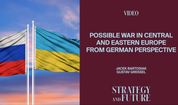Ukrainian nuclear weapons, the great energy crisis and “the best place in the world”

(Source: pixabay.com)
In his text from nearly 30 years ago, Mearsheimer presented in great detail the pros and cons of Ukrainian nuclear weapons. However, the conclusion was clear to him: Russia could not project power against Ukraine, because the possession of nuclear weapons eliminates the possibility of an effective power projection. That is why proliferation is fought so vigorously by all the nuclear powers, with the US at the forefront. Suffice to say that these were times when Ukraine had engineers who had created the Soviet space program, missile forces, nuclear energy and other highly innovative fields in which the Soviets tried not to lose their distance to the US during the Cold War.
It would be interesting, of course, then: what would be the other consequences of Kyiv’s possession of nuclear weapons? Would Poland, Turkey and Germany feel concerned, especially if Ukraine turned out to be (contrary to reality) a rapidly developing country, exerting geopolitical pressure on its neighbours? This is just speculation, because Ukraine gave up nuclear weapons, accepted the “cover” resulting from the Budapest Memorandum, which, as we know, ended with a great nothing. The lesson is that donating nuclear weapons in return for the promise of a guarantee is not a good deal.
Human decisions, however, are of fundamental importance for the future and development of the country, and its elite must be held accountable for them. Contrary to popular belief, not all Ukrainians were eager to surrender nuclear status, but there were also voices in Ukrainian political life against the donation of nuclear weapons. This case is extremely interesting and deserves a more detailed description, which we have already done in English at S&F some time ago with the writing of Ridvan Bari Urcosta.
In retrospect, one could risk a claim that a nuclear Ukraine would collapse the possibility of continental consolidation based on an agreement between France and Germany and Russia, if Ukraine were in close allied relations with the Americans and the British (after Brexit). Indeed similarly to a nuclear Poland.
By the way, it is sad how much the Western elite simplified their perception of the world in the 1990s. After 1991, the Soviet Union was considered equal to Russia for them and it was thought that they should have nuclear attributes. But this wasn’t obvious. Ukrainians also created the Soviet empire through their efforts and with their scientists, engineers and officers, including creating the nuclear program and producing the means of delivery of nuclear weapons. This simplified mental tracing paper: the Soviet Union equals Russia (although after a “slimming treatment”) worked here in all its glory.
And Zbigniew Brzeziński was right about Ukraine, because its subjective strengthening in the last 30 years would have thwarted continental consolidation, unfavourable for the powers of the World Ocean, and which consolidation may now seem unstoppable. This observation is also confirmed in the dimension of the gas game that Russia is directing towards Europe, pushing for continental consolidation on its own terms.
Because in the background of Russia’s military manoeuvring around Ukraine, there is a coercive bargaining – as Thomas Schelling called it – calibrated to break Europe.
A few words of introduction to the current world situation, including the huge global energy imbalance. As we know, the Americans started a trade war with China under Trump. Rather, they have not achieved success in it. Then they started a technology war. There is a fierce fight here, both sides are suffering losses, perhaps China’s are bigger. So leaders in Beijing already know that they are being targeted by Washington. Anyway, the US secretary of trade openly admitted, probably in December 2021, that the goal of the US was to slow down the process of innovation in the Chinese economy. In itself, this completely diplomatically shocking statement demonstrates the American approach to the struggle for world power.
The technological war began with a spectacular salvo towards the pearl in the Chinese crown – Huawei. And it was supposed to kill this company.
After this volley, Beijing will never believe in Washington’s conciliation declarations, so the Chinese are tirelessly strengthening their currency to immunise against the powerful American weapon, which is the dollar’s role in world markets resulting from financial domination (immunisation against it will be very difficult). The Chinese have absorbed Hong Kong, cracking down on protests and humiliating the Americans who support the protests. At the same time, Beijing’s mandarins are transforming their economy. While until recently they had to provide over 20 million jobs every year for people migrating from the countryside to the cities, now they are entering a period of dwindling hands, in a few years it will even decrease by several million a year due to demographics. This is a great change in the Chinese economy and it will have a significant impact on the China-Russia-Europe game, which we’ll talk about in a moment.
For several months now, we have had a growing security crisis in Europe in parallel with the massive energy crisis caused by Russia, steering the gas supply on the European market.
In our opinion at S&F, the Russians are doing this on purpose to strengthen their message to Western Europeans from the continent that without Russia it is impossible to settle the most important matters in Europe, including energy security, and thus the existence of European industry and agriculture – because this is what to comes down to in the long run. In the coming months, the Russians will earn a fortune from European protection money (gas prices are going crazy), which Western Europeans may want to pay to Moscow to keep the energy system functioning.
Let us return to China for a moment. The deal with the West was as follows: we produce for you at low prices thanks to cheap Chinese labour, great and expanded infrastructure and cheap Chinese energy, largely derived from hard coal and nuclear power plants. The OECD’s energy balance has not changed much in the last 15 years, while the Chinese have soared. This is what it was supposed to do, to produce cheaply for the West. In other words, the West exported environmental pollution to China, but at the same time enjoyed the cheap products made at the expense of the Chinese environment. For several years, Xi Jinping has been changing this arrangement, because the Chinese do not want to have rivers and lakes with the entire Mendeleev table anymore, smog in cities and their pampered only children with asthma. China is thinking more and more about exporting heavy production to places that do not have these problems. This is where Russia appears, having an abundance of raw materials, large and empty spaces beyond the Urals, which could produce for China what China no longer wants to produce by poisoning its own environment.
As Louis Gave often says, today China and Russia are ideal trading partners: raw materials for utility goods, industrial goods and capital for raw materials. In addition, Russia has a strong common interest with China to push the US out of Eurasia. Importantly, China can either spend its enormous surpluses from export production on American debt, strengthening its strategic rival (or at least keeping it in good shape), or it can “burn through” infrastructure and investments in Eurasia, including in Russia, which has a trading position both for continental Europe trying to find its place in Eurasia, and for China’s future success in building an economic area and Chinese economic domination in Eurasia.
At the same time, Russia may fulfil the same pivotal function towards Europe, avoiding becoming a vassal of China in time. Therefore, the ideas of creating a “Europe from Vladivostok to Lisbon” would require getting rid of the Americans for its implementation, and then forcing the Europeans into a new security pact with Russia and, in its implementation, a new economic pact.
In our opinion at S&F, this is the main goal of Russia’s grand strategy. Very ambitious, we admit. The Kremlin wants Russia to be an indispensable part of the new Europe as well as western and northern Eurasia, and yet not a vassal of China. The difficulty of the game lies in the need to first throw off US influence from Eurasia, break the Atlantic security system and force a new deal with the Europeans on the continent, which will also result in breaking the blockade of such ideas in Central and Eastern European countries – always opting for the continuation of US influence.
Europe will be better for Russia, and Russia has something to offer Europe: raw materials, space for investments, heavy industry, qualified and cheap labour, great military power, and even island technological innovations in several segments such as armaments or the space industry. So the Russian stake in the European company will be greater than in the company with China, for which Russia may only be a vassal in time.
In our opinion, the game around Ukraine is a part of this larger whole: hence the one-on-one talks with the USA destroying the confidence of France and Germany in the USA and awakening the “unhealthy” ambitions of Europeans from the continent to get along with Russia on their own; a manifestation of these are Macron’s latest ideas towards Moscow.
Gas pressure is intended to make Europeans aware that they are “motionless” in the geopolitical game of chess and must: firstly, pay Russia’s gas tribute, and secondly, they must establish partnership rules with Russia in the long term. Because “the best place in the world” (as Europeans think of their continent) does not have energy independence or major armed forces, but does have capital and technology. And a nice lifestyle.
The “best place in the world” in the real world of the clash of superpower forces is so far not invited to talks, does not fully trust the Americans, does not have its own army, there is no innovation on a scale comparable to the US and China, there are no champions of the digital revolution or leaders of the fourth industrial revolution, which is “around the corner”, there is actually no New Space space industry, and finally there are no good demographic forecasts. It is not an island either, which would keep it safe. So we have a kind of drama – in fact, Washington and Moscow will decide about war and peace in Europe in 2022.
Russia’s success in this ambitious game means the defeat of Poland, for the West its division, for the Germans it can mean a continental success – especially economic, and for the French who want to play “world chess,” a chance to participate in the game in Eurasia based on a new Europe from Vladivostok to Lisbon.
According to PGNiG data, the day ahead prices of TTF natural gas are currently 18.3 times higher than the average spot price in 2020 and 12.6 times higher than in 2019. We must be aware of what this means in the long run: the deindustrialisation of Europe, because European industry, with such energy prices, will not maintain its competitiveness, margins and profitability, which will make some consider moving their plants to Russia (or elsewhere – but where?), protecting capital and their investments or position on the world markets.
This certainly means problems with fertilisers, the production of which requires large amounts of gas, which will result in food shortages, inflation, political instability, populism, and perhaps – if the crisis lasts longer – even breaking the social contract in European countries.
Energy suppliers on the European market are already having problems with working capital loans. It is difficult to insure the risk at such rampant prices – the scale of the system instability is enormous. The price increase in the second half of 2021 is unprecedented. December price increases have been halted by rising temperatures in Europe and Asia and the redirection of LNG to Europe, which in turn stabilised prices after gas orders to Europe exceeded the prices obtained in Asia. It is worth adding, not necessarily in passing, that the Chinese minister ordered his state-owned enterprises to buy energy at any price. We know what this means for prices and for the seriousness of the moment.
At the time of writing, in January 2022, the energy situation is therefore very tense. Supplies from Russia, according to PGNiG data, in the first two weeks of the year were 41 percent lower than a year earlier. In addition, gas storage levels in Europe were low. Depending on the supply source and on the time and the temperatures in winter, there is a serious risk of extending the crisis for the next gas year due to the high cost of gas storage reserves for winter 2022/2023. The European market is betting on the stabilisation of the price of 40 EUR/MWh, but only from spring 2023 onwards, while in spring 2021 it was twice as low.
To a large extent, the gas crisis, apart from the return of demand to the pre-pandemic level, the decline in gas production in the Netherlands and the United Kingdom and forced decarbonisation, is the responsibility of Gazprom, which acts in such a way as to disrupt market price mechanisms and, as a result, forces a privileged relationship based on the Nord Stream 2 gas pipeline. All shipments fell, except for Nord Stream 1. For example, Gazprom does not reserve any capacity on the Yamal pipeline, which is operating in a reverse direction, and transit to Germany has been suspended.
The European response is reduced to protecting gas consumers, not to the great change of dependence on Russia and the search for a new systemic solution. Until predictable storage of solar energy is available, and a new type of battery would lead to the energy revolution we are all waiting for, the Russians will continue to play their game with cards that are becoming more and more obvious.
European governments are bailing out users with maximum prices, state guarantees for energy and gas suppliers, temporary gas price freezes, compensation for suppliers, working capital loans from state-owned entities such as the German KfW to gas suppliers, support mechanisms for households, and even – as in Italy – covering system fees directly from the state budget.
It is more and more evident that after Brexit, the continental game of agency is pushing Western European countries to cooperate with Russia and China even on an issue such as gas, and this is due to the lack of a real alternative. In all this lies our dear motherland, squeezed between the geopolitical Land and Sea, between the powers of the World Ocean and the Continent.
Russia “hangs” militarily on our part of Europe, it also has a powerful leverage on Europe thanks to its energy resources, and it can also appear to be crucial for Europe in its behaviour towards the growing power of China. Thus, Russia has three powerful levers on Europe, on which, in fact, European social and political stabilisation depends. Russia leans over “the best place in the world” and presses the control stick.
It is clearly visible that Nord Stream 2 is to be the killer of the independence of Central and Eastern Europe, making it a periphery in the arrangements between Russia and, for example, Germany. The purpose of the construction of Nord Stream 2 is not to ensure the gas supply necessary for Europe, but to enable the exclusion of the existing Polish and Ukrainian gas routes as states of natural allies of the USA and the presence of the USA in Europe. Without the American influence on the behaviour of Germany and Russia, it is difficult for the Polish game of subjectivity in our part of the world.
Autor
Jacek Bartosiak
CEO and Founder of Strategy&Future, author of bestselling books.






Trwa ładowanie...